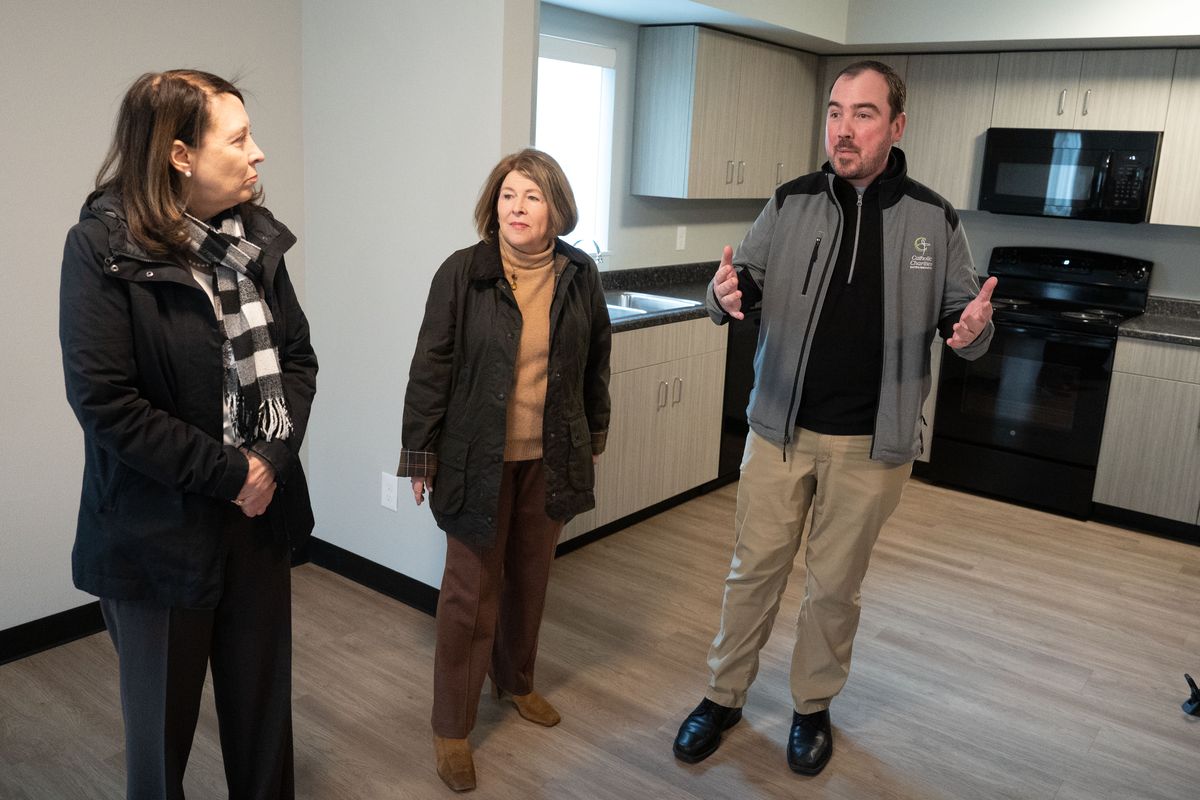A ‘win-win-win’: City leaders push for Cantwell-led expansion of federal low-income housing tax credit

There are more people on a waiting list for low-income housing in Spokane County than there are low-income housing units.
One way to close that gap affecting thousands of local residents is expansion of the federal Low-Income Housing Tax Credit to spur construction to boost the supply side of the equation, U.S. Sen. Maria Cantwell said during a stop in Spokane to pitch the effort to her constituency in Eastern Washington.
“Spokane is growing, and that puts more pressure on the need for affordable housing,” Cantwell said at Mother Teresa Haven, a Spokane low-income housing project funded by the credits. “For those who are on a very fixed income, (more supply) can mean the difference between having a roof over your head and not. And that is why in Spokane – just like the rest of Washington state – we have to be very vigilant about building more supply.”
Ben Stuckart, director of the Spokane Low Income Housing Consortium, and other city leaders met Wednesday in a show of support with Cantwell.
“It all sounds like gobbledygook,” Stuckart said of the complicated federal program. “I don’t really understand it, but it means more projects will happen.”
If passed, the bill would lead to the construction of 200,000 additional units across the country, including 7,000 more units in Washington state, during the next two years, according to Cantwell.
She was joined Monday by Spokane Mayor Lisa Brown, pointing to developers who are “ready” to build low-income housing if only they were eligible to receive a tax credit.
Built by Catholic Charities, the 48-unit affordable housing apartment complex Mother Teresa Haven received 70% of its funding from the federal tax credit program.
“Our mission is to support human dignity and to serve our region’s most vulnerable. Mother Teresa Haven is an example of how this is one of the most important ways we’ve fulfilled this mission through providing supportive affordable housing,” said Jonathan Mallahan, chief housing officer for Catholic Charities.
Speaking at the event, Mother Teresa Haven resident Marci Pavlo said low-income housing “changed the trajectory” of her life after losing her house in 2018. With the complex’s lower rents, Pavlo was able to quit her second job, go back to school and be much more present in her children’s lives.
“I wasn’t able to do that before. I was too busy trying to save my home and pay my car bill,” Pavlo said. “This led me to be able to also spend time with my kids and coach my youngest daughter’s basketball and softball. I’m grateful for the opportunity.”
What would Cantwell’s bill do?
The U.S. House of Representatives passed a $78 billion tax package on Jan. 31 in a bipartisan 357 to 70 vote. The bill’s primary purpose is to expand the country’s child tax credit, but it also included Cantwell’s provisions to expand federal low-income housing credits.
These specific provisions of the bill propose incentives to developers and increasing low-income housing units by adding the number of credits available and lowering the amount of the bonds needed to get another kind of low-income housing credit.
Under the bill, the number of housing credits would be increased by 12.5% through 2025. That increase was previously in place but expired in 2022.
Another type of housing credit is obtained when a specific project is predominately financed through state housing bonds.
Under the current “bond test,” low-income housing needs 50% of its financing to come from state bonds to receive the federal housing credit. Cantwell’s bill lowers that requirement to 30% of project financing.
Having this lower threshold allows states like Washington to spread their bonds to more projects that then become eligible for the federal housing credit. The effect of this policy would add an additional 1,500 units of housing financed in 2024, per the Washington State Housing Finance Commission.
A spokesperson for the state agency said the commission, which distributes the federal housing credits to projects in Washington state, is “very excited of the possibility” of Cantwell’s bill passing into law.
“We have many, many projects that are ready to go, but right now there’s not enough (housing credits) to go around,” said Washington State Housing Finance Commission spokesperson Margret Graham.
Each year, approximately two to four times as many projects apply for the commission’s housing credits than the number of credits they can allocate.
Cantwell called the expansion a “win-win-win.”
“It stimulates the economy, drives down cost and gets more affordable units. People just don’t understand how much we need to build,” she said.